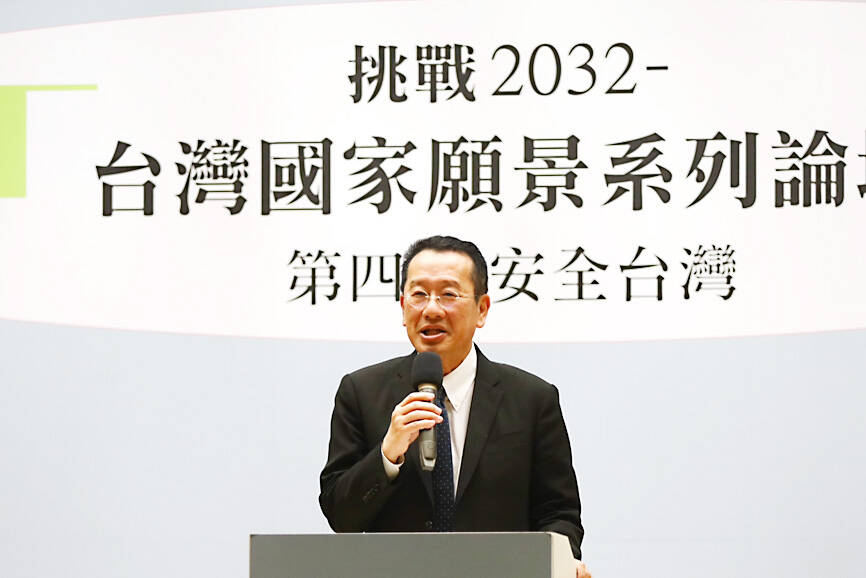Taiwan is facing more frequent, sophisticated and concealed cognitive warfare a month ahead of the presidential election, National Security Council Secretary-General Wellington Koo (顧立雄) said yesterday.
It is China, not Taiwan, that does not accept the “status quo” of peace and stability in the Taiwan Strait and is pushing cross-strait relations to the brink of war, Koo told a forum held by Taiwan Think Tank in Taipei.
China “has made no secret” of its ambition to annex Taiwan, continuing to harass the nation with military and economic coercion, diplomatic isolation, cyberattacks and cognitive warfare, he said.

Photo: CNA
Beijing has been carrying out such operations in a planned manner in an attempt to divide and isolate Taiwan, and weaken Taiwanese unity and the will to resist, he said.
Freedom in Taiwan is facing serious threats as the nation’s presidential and legislative elections draw near, he said.
Nonetheless, Taiwan’s seemingly fragile democratic system is resilient, bringing its economic power onto the global stage with the innovative efforts enabled by an open capitalist society, he said.
Sharing common values with the world’s democratic camp, Taiwan is committed to maintaining the “status quo” in the face of uncertainty and potential geopolitical risks, he said.
Taiwan has also considerably raised its visibility worldwide as a force for good, he said, adding: “We are not alone.”
China’s ambitions to expand its influence challenge the international order and affect not only Taiwan, but also countries such as Japan, the Philippines and India, he said.
Countries in the Americas, Asia and Europe have abandoned the “unrealistic illusion” that political reform would occur alongside market opening and economic development in China, he said.
The US and its allies are well aware that Chinese President Xi Jinping (習近平) “plays by no rules” and that the Chinese military buildup cannot be ignored, he said.
To manage the risks, the US is trying to maintain high-level dialogue with China while working with allies to strengthen deterrence, he said.
Research by a foreign think tank shows that if a cross-strait conflict breaks out, the initial stage of a blockade of Taiwan could cause global economic output to fall by up to US$2 trillion, he said, adding that the actual losses could be astronomical and difficult to estimate.
As the second-largest economy in the world, China would suffer the largest losses from this global economic disaster, which is likely to lead to a collapse of an already-weak Chinese economy, he said.
The Chinese threat Taiwan is facing is a global threat as peace and stability across the Taiwan Strait are crucial to global security, he said.
The US is increasingly focusing its military in the Indo-Pacific region, while Japan has boosted its national defense budget and troops on the Nansei Islands, and the Philippines has expanded its defense cooperation with the US, he said.
Taiwan must have the determination to stand together with the international community and jointly build a credible and effective deterrent, he said.

The manufacture of the remaining 28 M1A2T Abrams tanks Taiwan purchased from the US has recently been completed, and they are expected to be delivered within the next one to two months, a source said yesterday. The Ministry of National Defense is arranging cargo ships to transport the tanks to Taiwan as soon as possible, said the source, who is familiar with the matter. The estimated arrival time ranges from late this month to early next month, the source said. The 28 Abrams tanks make up the third and final batch of a total of 108 tanks, valued at about NT$40.5 billion

Two Taiwanese prosecutors were questioned by Chinese security personnel at their hotel during a trip to China’s Henan Province this month, the Mainland Affairs Council (MAC) said yesterday. The officers had personal information on the prosecutors, including “when they were assigned to their posts, their work locations and job titles,” MAC Deputy Minister and spokesman Liang Wen-chieh (梁文傑) said. On top of asking about their agencies and positions, the officers also questioned the prosecutors about the Cross-Strait Joint Crime-Fighting and Judicial Mutual Assistance Agreement, a pact that serves as the framework for Taiwan-China cooperation on combating crime and providing judicial assistance, Liang

A group from the Taiwanese Designers in Australia association yesterday represented Taiwan at the Midsumma Pride March in Melbourne. The march, held in the St. Kilda suburb, is the city’s largest LGBTQIA+ parade and the flagship event of the annual Midsumma Festival. It attracted more than 45,000 spectators who supported the 400 groups and 10,000 marchers that participated this year, the association said. Taiwanese Designers said they organized a team to march for Taiwan this year, joining politicians, government agencies, professionals and community organizations in showing support for LGBTQIA+ people and diverse communities. As the first country in Asia to legalize same-sex

MOTIVES QUESTIONED The PLA considers Xi’s policies toward Taiwan to be driven by personal considerations rather than military assessment, the Epoch Times reports Chinese President Xi Jinping’s (習近平) latest purge of the Chinese People’s Liberation Army (PLA) leadership might have been prompted by the military’s opposition to plans of invading Taiwan, the Epoch Times said. The Chinese military opposes waging war against Taiwan by a large consensus, putting it at odds with Xi’s vision, the Falun Gong-affiliated daily said in a report on Thursday, citing anonymous sources with insight into the PLA’s inner workings. The opposition is not the opinion of a few generals, but a widely shared view among the PLA cadre, the Epoch Times cited them as saying. “Chinese forces know full well that